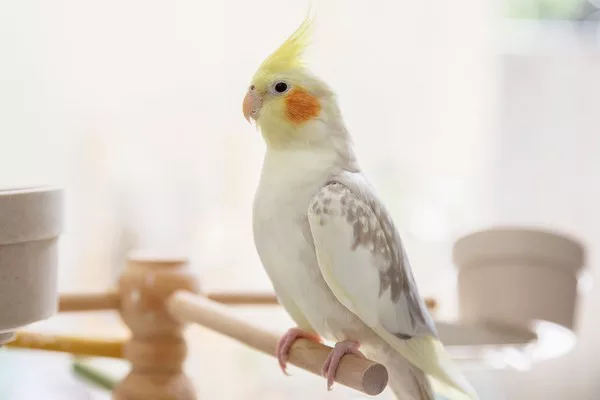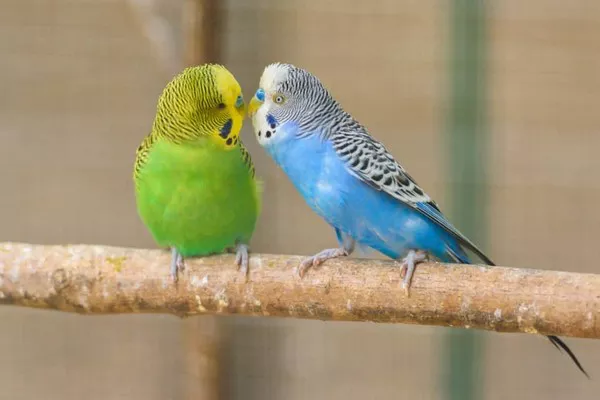African Grey Parrots, known for their incredible intelligence and striking appearance, have captivated bird enthusiasts for years. These birds are prized not only for their remarkable talking ability but also for their affectionate and loyal nature. However, a pressing question for potential African Grey owners often arises: “Do African Grey Parrots need a companion?” In this comprehensive article, we will explore the many facets of this question, considering the well-being and happiness of these magnificent birds.
The Social Nature of African Grey Parrots
African Grey Parrots, scientifically classified as Psittacus erithacus, are native to the dense rainforests of West and Central Africa. In the wild, they live in flocks, forming strong social bonds with their fellow parrots.
This social nature is a fundamental aspect of their existence and a key factor to consider when determining whether or not African Grey Parrots need a companion.
In their natural habitat, African Grey Parrots engage in various social activities. They forage for food together, preen each other, and even communicate using a sophisticated system of vocalizations. This rich social life in the wild raises the question: “Do African Grey Parrots need a companion in captivity to replicate this environment?”
The Benefits of Companionship for African Grey Parrots
One of the most compelling arguments for providing African Grey Parrots with a companion is the enrichment it brings to their lives. In captivity, these intelligent birds may become lonely and bored without social interaction. A companion can fulfill their need for companionship and mental stimulation.
African Grey Parrots are renowned for their impressive vocabulary and ability to mimic sounds and words. This intellectual prowess requires continuous mental stimulation, and companionship can help maintain their cognitive abilities. A companion African Grey can engage in vocal duets and even teach each other new words, which can be a fascinating and entertaining experience for their owners.
Factors to Consider When Deciding on a Companion
Before deciding to introduce a companion to your African Grey Parrot, several factors should be considered. It’s essential to remember that not all African Greys will have the same social needs and preferences.
Therefore, taking the individual personality and history of your parrot into account is crucial.
1. Personality and Temperament: African Grey Parrots can have various temperaments. Some may be more sociable and welcoming of a companion, while others may be more territorial or independent.
Observing your parrot’s behavior and consulting with an avian behaviorist can help determine their compatibility with another bird.
2. Introduction Method: If you decide to introduce a companion, it’s essential to do so gradually and under controlled conditions. Abruptly placing two unfamiliar African Greys together can lead to aggression and stress. Consult with an avian veterinarian or a specialist for guidance on the introduction process.
3. Compatibility: The gender and age of the companion bird should be carefully considered. African Grey Parrots can form strong bonds with both same-sex and opposite-sex companions. Additionally, introducing a companion of similar age and activity level can increase the likelihood of a successful pairing.
4. Health Considerations: Before introducing a new bird, it’s crucial to ensure that both your current African Grey and the potential companion are in good health. A thorough veterinary examination is necessary to prevent the spread of diseases.
Signs of Loneliness in African Grey Parrots
To understand whether your African Grey Parrot requires a companion, you need to be attentive to signs of loneliness and stress. These intelligent birds can communicate their emotions through body language and behavior. Here are some common indicators of loneliness in African Grey Parrots:
1. Excessive Vocalization: Loneliness may lead to increased vocalizations. African Grey Parrots may become noisier when they lack social interaction, as they are trying to engage with their human companions.
2. Feather Plucking: Stress and loneliness can manifest in destructive behavior like feather plucking. If your parrot is plucking its feathers, it may be a sign of emotional distress.
3. Lethargy: Loneliness can lead to a lack of interest in toys, activities, or their environment. A lonely African Grey may appear lethargic and disinterested.
4. Aggression: Some African Greys may become aggressive when they are lonely or feel threatened. This behavior can manifest as biting, snapping, or other aggressive actions.
5. Seeking Constant Attention: If your parrot becomes overly dependent on your attention, it might be trying to compensate for the lack of companionship.
Potential Drawbacks of Providing a Companion
While providing a companion to your African Grey Parrot has many benefits, it’s essential to consider potential drawbacks as well. Not all African Greys will readily accept a companion, and introducing one may lead to unexpected challenges:
1. Incompatibility: If the introduced companion and your existing African Grey do not get along, it can result in stress and aggression. This may even lead to injuries if not managed properly.
2. Jealousy: African Grey Parrots can be possessive of their human companions. Introducing a new bird may lead to jealousy and territorial behavior.
3. Increased Noise: While some African Greys may become quieter with a companion, others may become noisier. Vocal duets and chattering between the birds can be loud.
4. Higher Financial Costs: Owning two parrots means increased costs for food, housing, and veterinary care. It’s important to consider the financial implications of providing for two birds.
Alternatives to Companionship
If you’re concerned about the potential drawbacks or challenges of introducing a companion to your African Grey Parrot, there are alternative ways to address their social and mental needs:
1. Social Interaction with Humans: African Grey Parrots can form incredibly strong bonds with their human caregivers. Spending quality time with your parrot, engaging in activities, and providing mental stimulation can go a long way in meeting their social needs.
2. Toys and Enrichment: Offer a variety of toys and enrichment activities to keep your parrot mentally engaged. Puzzle toys, foraging toys, and interactive games can help prevent boredom.
3. Playdates and Socialization: If you’re concerned about your parrot being lonely when you’re away, consider arranging playdates with other African Grey owners or visiting an avian socialization group.
4. A Well-Structured Environment: Create an enriched environment within your parrot’s enclosure. Include perches, swings, and natural branches to encourage physical activity and exploration.
5. Training and Tricks: Training your African Grey in new tricks and behaviors can provide mental stimulation and strengthen your bond.
Consulting with Experts and Avian Behaviorists
When deciding whether to provide a companion for your African Grey Parrot, it’s crucial to seek advice from experts and avian behaviorists. These professionals can assess your parrot’s specific needs and help you make an informed decision.
Avian behaviorists have extensive experience in understanding parrot behavior and can provide guidance on introducing a companion, if appropriate, and managing any potential issues that may arise. They can also offer valuable advice on training, enrichment, and creating a stimulating environment for your parrot.
Conclusion
In conclusion, the question “Do African Grey Parrots need a companion?” does not have a one-size-fits-all answer. The decision to introduce a companion should be made with careful consideration of your individual parrot’s personality, needs, and preferences.
While companionship can offer numerous benefits, it is not the only way to meet the social and mental needs of African Grey Parrots. With proper attention, training, and an enriched environment, you can provide a fulfilling and happy life for your parrot even if they are the sole feathered resident in your home.
Remember that your parrot’s well-being is of utmost importance, and consulting with avian experts can help you make the best decision for your African Grey’s happiness and health. Whether you choose to provide a companion or focus on alternative means of enrichment, your commitment to your parrot’s welfare is what truly matters.
Related Topics:
African Greys as Pets: A Comprehensive Guide for Beginners
How Long Do African Greys Live as Pets ?
What Can African Greys Not Eat?

























